pope
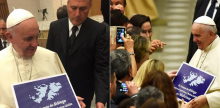
Francis’ inadvertent gesture of support for renewed talks between the two countries inevitably caused a stir in his home city, Buenos Aires, with Argentine President Cristina Kirchner posting the pope photograph on Twitter. So too did Argentina’s foreign ministry, writing: “Pope Francis receives the Argentina-UK pro-dialogue message.”
But the Vatican played down the significance of the moment, saying the pope had no idea what was written on the sign. “The Holy Father did not even realize he had taken this object in his hands. He has discovered this just now after seeing the photograph,” the Vatican said in a statement.
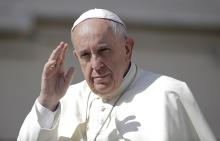
Pope Francis on Aug. 19 reflected on the "serious social damage" caused by unemployment and praised governments for their efforts to create jobs.
Speaking during his weekly audience in St. Peter’s Square, Francis said one’s working life and spiritual life are closely linked.
"The lack of work also damages the spirit, like a lack of prayer also damages practical activity," he said.
The pontiff focused on the dignity of work and the responsibility of employers.
"The management of employment is a great human and social responsibility, that cannot be left in the hands of the few," he said.
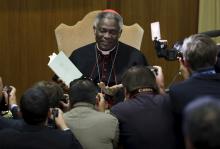
The Vatican is calling on bishops globally to act on the pope’s groundbreaking environmental encyclical, Cardinal Peter Turkson said in an interview.
Last week, bishops’ conferences across the world were sent a message urging them to speak up about the message of the papal letter, which called for greater action on the environment, said Turkson, who is president of the Vatican’s Pontifical Council for Justice and Peace.

The interfaith element of the pope’s environmental message was reflected in the diverse range of religious leaders present.The interfaith element of the pope’s environmental message was reflected in the diverse range of religious leaders present.Religious leaders from across the globe led a “Many Faiths – One Planet” march to the Vatican on June 28, to show their support of Pope Francis’ groundbreaking environmental encyclical.
Organizers estimated a crowd of 5,000 people reached St. Peter’s Square to celebrate the pontiff’s tough stance on climate change, after parading through Rome under a canopy of painted banners.
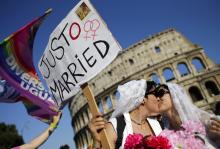
Pope Francis on June 14 stressed the importance of children having heterosexual parents, just a day after Rome’s gay pride march demonstrated the changing attitudes about same-sex couples outside the Vatican walls.
Addressing around 25,000 followers from the Diocese of Rome, the pope said the differences between men and women are fundamental and “an integral part of being human.”
The pontiff likened a long-lasting marriage to a good wine, in which a husband and wife make the most of their gender differences.
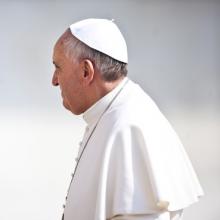
Pope Francis faces no specific threat from Islamic State militants and will not be adding extra security measures on his one-day trip to Albania next week, the Vatican said Sept 15.
The Vatican’s chief spokesman, the Rev. Federico Lombardi, said despite recent “worrying” events that had shocked the world, there was no specific threat to the 77-year-old pontiff as he prepared for his official visit to the majority Muslim country on Sept. 21.
Lombardi said Francis would use the same open-topped vehicle he uses to greet crowds in St. Peter’s Square when he travels to the Albanian capital, Tirana.
“There is no reason to change the pope’s itinerary,” Lombardi said. “We are obviously paying attention but there is no need for concern or a change to his program in Albania.”
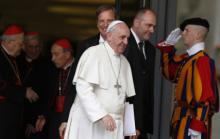
In his strongest personal remarks yet on the clergy sex abuse scandal, Pope Francis on Friday asked forgiveness “for the damage” that abusive priests have inflicted on children and pledged that the Catholic Church “will not take one step backward” in efforts to address the crisis.
“I feel compelled to personally take on all the evil that some priests — quite a few in number, though not compared to the total number — and to ask for forgiveness for the damage they have done by sexually abusing children,” Francis said.
“The church is aware of this damage,” he said. “It is personal and moral damage, but carried out by men of the church. And we do not want to take one step backward in dealing with this problem and the sanctions that must be imposed. On the contrary, I believe that we have to be very firm. Because you cannot take chances with children!”
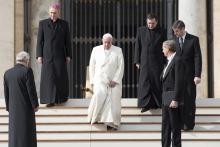
Days after discussing the U.S. Catholic bishops’ fight over contraception with President Obama, Pope Francis met Monday with members of the Green family, the Oklahoma billionaires whose company, Hobby Lobby, took their challenge to Obama’s contraception mandate to the Supreme Court last week.
The pope met with Obama on Thursday for the first time, touching on some hot-button disputes between the White House and U.S. Catholic bishops.
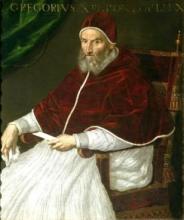
Let’s be clear: April Fools’ Day is not a religious holiday.
It does, however, trace its origins to a pope.
The day began, most believe, in 1582, when Pope Gregory XIII decreed the adoption of the “Gregorian calendar” — named after himself — which moved New Year’s Day from the end of March to Jan. 1.
The change was published widely, explains Ginger Smoak, an expert in medieval history at the University of Utah, but those who didn’t get the message and continued to celebrate on April 1 “were ridiculed and, because they were seen as foolish, called April Fools.”
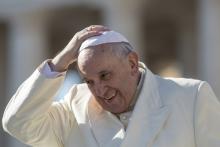
Today the world celebrates Pope Francis’ first year. Notice I didn’t say the church is celebrating, but the world. The pope has graced the covers of every magazine from TIME to Rolling Stone over the past year. People all over the world are delighted by the breath of fresh air he has brought. His popularity has moved beyond Catholics to Christians of all kinds, believers from other faith traditions, agnostics, and the “nones,” who are very drawn to this pope who emphasizes love and simple living.
But the pope said last week that he is not a “ superman” and does not want to be a celebrity. He is just trying to talk and live like Jesus, a point he makes repeatedly to shrug off his media darling standing. From the moment he took the name Francis, he made clear his, and thus the church’s priorities: the poor, peace, and the creation. Francis is now challenging the most powerful people and places in the world, as well as a popular culture that mostly asks how we can serve ourselves.
Pope Francis is right: it is not about him; it’s about the Christ he follows. Everything Francis is saying and doing is aimed at pressing this question: Are Christians going to follow Jesus or not? That should be the question on the first anniversary of this new pope. Are we Christians ready and willing to follow Jesus? How can we then serve the world?

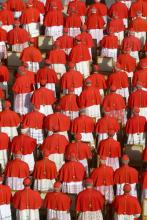
IN MINDANAO, Philippines, a cheer went up: Mayron tayong cardinal! (“We have a cardinal!”) In January, Orlando B. Quevedo, archbishop of Cotabato, was one of 19 new cardinals named by Pope Francis.
Cardinal Quevedo rose from newsboy to archbishop. He’s renowned for his interreligious work and cofounding a Catholic-Muslim peace community in the southern Philippines where there is violent ethnic conflict. Quevedo is a leader in the Federation of Asian Bishops’ Conferences, a body representing more than 100 million Catholics that has courageously pushed forward the values of Vatican II amid traditionalist backlash.
During a papal conclave, when a new pope is chosen, much of the world, Catholic and otherwise, pays close attention to the news ticker from the Vatican. For the selection of new cardinals, not so much. But with Francis, everything bears watching.
Historically, cardinals were called “the princes of the church” because of the power they wielded. Functionally, they serve in the College of Cardinals, which meets with the pope to deal with questions of major importance and elects new popes. Sadly, scoring a red hat has been for some the acme of clerical ambition. The season of cardinal picking can devolve into extravagant indulgence.
But, there’s a new sheriff in town: Pope Francis wants deputies, not darlings.

“GOD CREATED the world and we created borders.”
That obvious recognition was shared at a recent consultation in Quito, Ecuador, between North American and Latin American churches on “Faith, Economy, and Migration.” Felipe Adolf, president of the Latin American Council of Churches, shared that conclusion on how issues of migration and reform are global and not just local.
It’s very easy to see the problems confronting our nation and feel as though the challenges facing the rest of the world are simply too much to bear. Continuing poverty and unemployment, discrimination of all kinds, and wars and rumors of wars fill our newsfeeds, papers, and TV screens. But it’s naïve and narrow to think this way. Many of the threats we face are global in nature and don’t know any boundaries. Through our economies and consumption habits, media, travels and migrations, and for Christians in particular our faith, we are inextricably connected with men and women around the world. It’s always been important, but now especially so, to think globally when it comes to faith and justice.
Sojourners has a long history of doing this very thing. We started as a little group of two kinds of people—those who had grown up conservative evangelicals and were deeply frustrated with the lack of attention to issues of justice and peace, and those who had just come to faith from the student movements and counterculture of the 1960s and ’70s. We met at Trinity Evangelical Divinity School and began to study and pray through the scriptures about injustice, war, and poverty. The Vietnam War was raging, and we were looking for a biblical understanding of the events of our time.
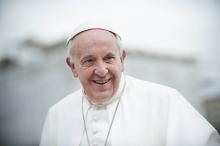
Listen in as Jim Wallis and Sojourners CEO Rob Wilson-Black kick off the new year with a discussion on Pope Francis and the new Pope's influential presence in all kinds of media.
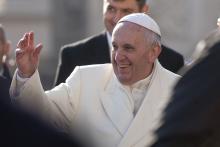
"Preach the Gospel at all times, and if necessary, use words" is a quote widely attributed to St. Francis of Assisi. It also seems to be the motto of Pope Francis. Instead of just talking about abstract doctrines, he consistently lives out his beliefs in public ways that have grabbed the world's attention. His example of humility, compassion, and authenticity resonate powerfully in Washington, where cynicism is rampant, pride remains even after the proverbial falls, and an ideology of extreme individualism has overtaken a significant faction within our politics.
The Pope's words and deeds fascinate us because they are genuine and selfless. How could a leader of global significance spend time cold calling pregnant women in distress, kissing the feet of young Muslim inmates, or embracing a disfigured man? What sorts of values motivate such behavior? These stories touched our hearts, but they appeared irrelevant to our politics.
Then the Pope started talking about our wallets, which, according to a several commentators on the far right, instantly transformed him into a threat to capitalism itself.
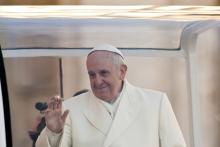
The other day I observed a Twitter exchange between Pope Francis and Miroslav Volf.
Pope Francis (@Pontifex) Tweeted:
“God does not reveal himself in strength or power, but in the weakness and fragility of a newborn babe.”
To which Miroslav Volf (@MiroslavVolf) replied:
“@Pontifex How true! And yet the babe grew and taught with power and authority, and the crucified one was raised from the dead in glory.”
Since moving to the Navajo reservation more than a decade ago, I have done much thinking, studying, praying, and reflecting on the dynamics between power and authority. And God has given me a few insights over the years. So when I read these tweets I had an instant desire to jump in and be a part of the discussion.
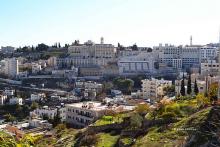
Christmas is the one time each year when much of the world turns its gaze to Bethlehem, the West Bank town at the heart of the Gospel account of Jesus’ humble birth in a stable.
But Bethlehem may be in for a second round of global publicity in the span of a few months with the expected visit of Pope Francis in May.
In an interview earlier this month, Francis confirmed rumors that he planned to travel to the Holy Land — probably stopping at sites in Jordan, Israel and the West Bank in the Palestinian territories — and said preparations were underway.
Then last week the Latin patriarch of Jerusalem, the top Catholic official in the region, revealed that the visit was set for May.
Given the political and religious combustibility that attends almost any event in the Holy Land, a papal trip was bound to be fraught and a debate over the visit quickly erupted as Israeli newspapers reported that the preliminary itinerary for Francis’ pilgrimage has him spending just one full day in Israel proper — probably arriving in Jordan on Saturday, May 24, traveling to Israel on Sunday morning, then celebrating Mass in Bethlehem on Monday before heading back to Rome.

ROME — It’s official, but no big surprise: Pope Francis is now the most-talked-about person on Facebook, according to information released Dec. 10 by the social media giant.
Pope Francis took the top spot, followed closely by Royal Baby George.
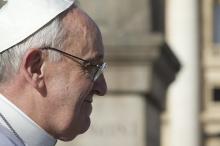
When Pope Benedict XVI retired in February, I wrote an article in appreciation for his papacy. While he served as a great model of humility in stepping down from his role as Pope, what I appreciated more about Pope Benedict was his first encyclical, turned into a book called God is Love . In it, Benedict wrote these profound words:
Love is possible, and we are able to practice it because we are created in the image of God. To experience love and in this way to cause the light of God to enter into the world — this is the invitation I would like to extend with the present encyclical. (93)
God is Love is a powerful written reminder of the essence of Christianity. I hope more Christians of all stripes will read it.
Indeed, I appreciate Benedict for writing those beautiful words, but I love Pope Francis because he’s publicly living those words.
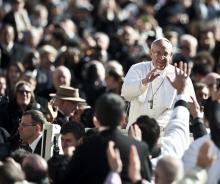
For the first time in a while, I'm feeling optimistic about the direction of the Catholic church's hierarchy in general and about the office of the papacy in particular. Many authors have written about the plethora of ways in which Pope Francis is hitting the "restart" button for a church so devastated by sexual and financial corruption.
Forgotten, however, is the fact that Pope Benedict XVI had to resign for this breath of fresh air to occur. The pope emeritus deserves recognition for his courageous and humble decision and action. Paradoxically, the conservative pope's nontraditional decision to resign has paved the way for the current pope to begin to mend the broken church structures that have allowed corruption to continue unchecked.